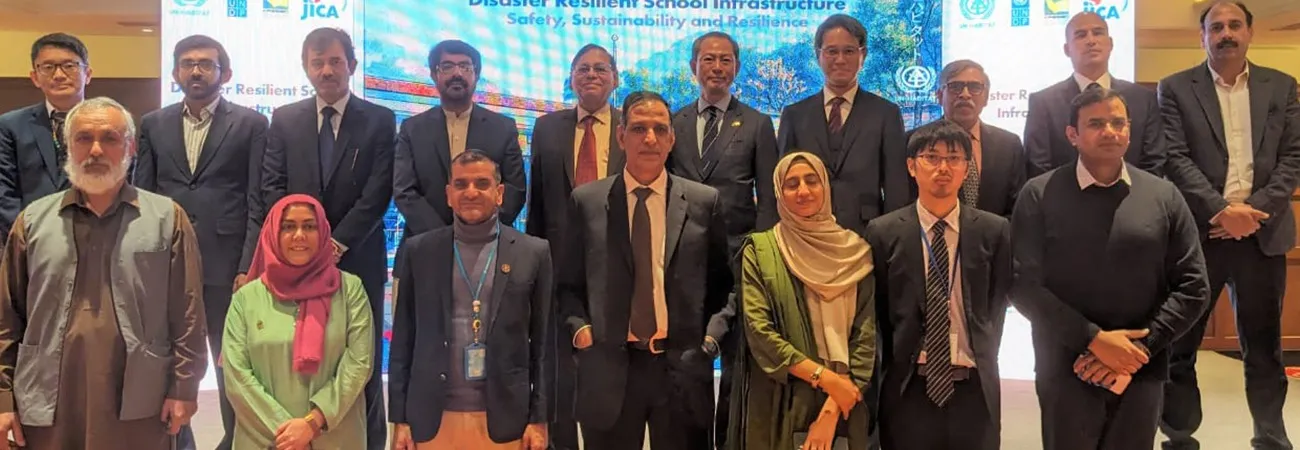i NEWS PAKISTAN
UN-Habitat hosted a high-level gathering to highlight progress made in advancing disaster-resilient school infrastructure and to present the achievements of the Disaster Resilient School Infrastructure (DRSI) Project. This marks an important milestone in efforts to create safer and more resilient learning environments for children in Pakistan’s disaster-prone regions.
Khyber Pakhtunkhwa has long been one of Pakistan’s most affected provinces, facing repeated earthquakes, floods, and climate-induced hazards that have severely damaged school infrastructure. Many buildings constructed before the introduction of Pakistan’s 2007 Building Code remained vulnerable due to the absence of seismic provisions. To respond to these challenges, the DRSI Project was initiated by UN-Habitat to improve the structural safety of schools through retrofitting, repair, and the upgrading of essential facilities.
This project was funded with 471 million Japanese Yen by the Government of Japan and Japan International Cooperation Agency (JICA), and jointly implemented by UN-Habitat and UNDP in close coordination with the Elementary and Secondary Education Department, Khyber Pakhtunkhwa Province, the initiative strengthened 150 schools across eight districts. The project improved the learning environment for 31,000 students, including 13,595 girls, and rehabilitated 300 gender-responsive WASH facilities, including facilities in 66 girls’ schools.
Speaking at the event, Mr. Jawed Ali Khan, Senior Advisor and Programme Manager at UN-Habitat, emphasized UN-Habitat’s leadership in delivering safer school environments. He noted that the retrofitted schools now provide structurally stable classrooms, improved ventilation and lighting, and essential WASH services that allow children to learn with confidence and security. JICA’s Chief Representative, Mr. Naoaki Miyata, said this project would contribute to enhance resilience of primary, middle and high school buildings in disaster prone areas of Khyber Pakhtunkhwa in 8 districts, Buner, Swat, Malakand, Peshawar, Chitral Upper & Lower and Dhir Upper and Lower.
The Ambassador of Japan to the Islamic Republic of Pakistan, H.E. Mr. Akamatsu Shuichi appreciated the collaborative effort and reaffirmed Japan’s support to Pakistan’s resilience agenda. He said that strengthening school infrastructure is a vital investment in protecting children and ensuring that education continues even in the face of natural disasters. Mr. Hamid Mumtaz, Deputy Programme Manager at UN-Habitat, highlighted the urgent need to strengthen resilience in schools across disaster-prone regions.
With two decades of experience in Pakistan, UN-Habitat has guided disaster risk reduction, safer reconstruction, national guidelines for earthquake- and flood-resistant construction, and multi-hazard risk assessments, contributing to safer and more resilient learning environments for children across Khyber Pakhtunkhwa. The Secretary of the Elementary and Secondary Education Department, Government of Khyber Pakhtunkhwa, expressed appreciation for the support of the Government of Japan, JICA, UN-Habitat, and UNDP noting that the project has strengthened school safety in districts previously hit hard by earthquakes and floods.
He emphasized that continued collaboration is essential to ensure long-term resilience across the education sector. The improved school environments have strengthened trust within communities and encouraged regular attendance. The National Disaster Management Authority (NDMA) recognized the project as an important contribution to national disaster preparedness, stressing that resilient school infrastructure can save lives, reduce long-term losses, and ensure uninterrupted learning for children living in vulnerable areas.
The DRSI Project demonstrates how targeted investment in structural safety, WASH facilities, and resilience-building measures can bring children back to school and support equitable access to education. While the project has significantly improved conditions across 150 schools, the need in Khyber Pakhtunkhwa remains far greater than available resources. Continued investment is essential to protect children, strengthen school resilience, and advance Sustainable Development Goal 4, which calls for safe, inclusive, and quality learning environments for all.
Credit: Independent News Pakistan (INP)









